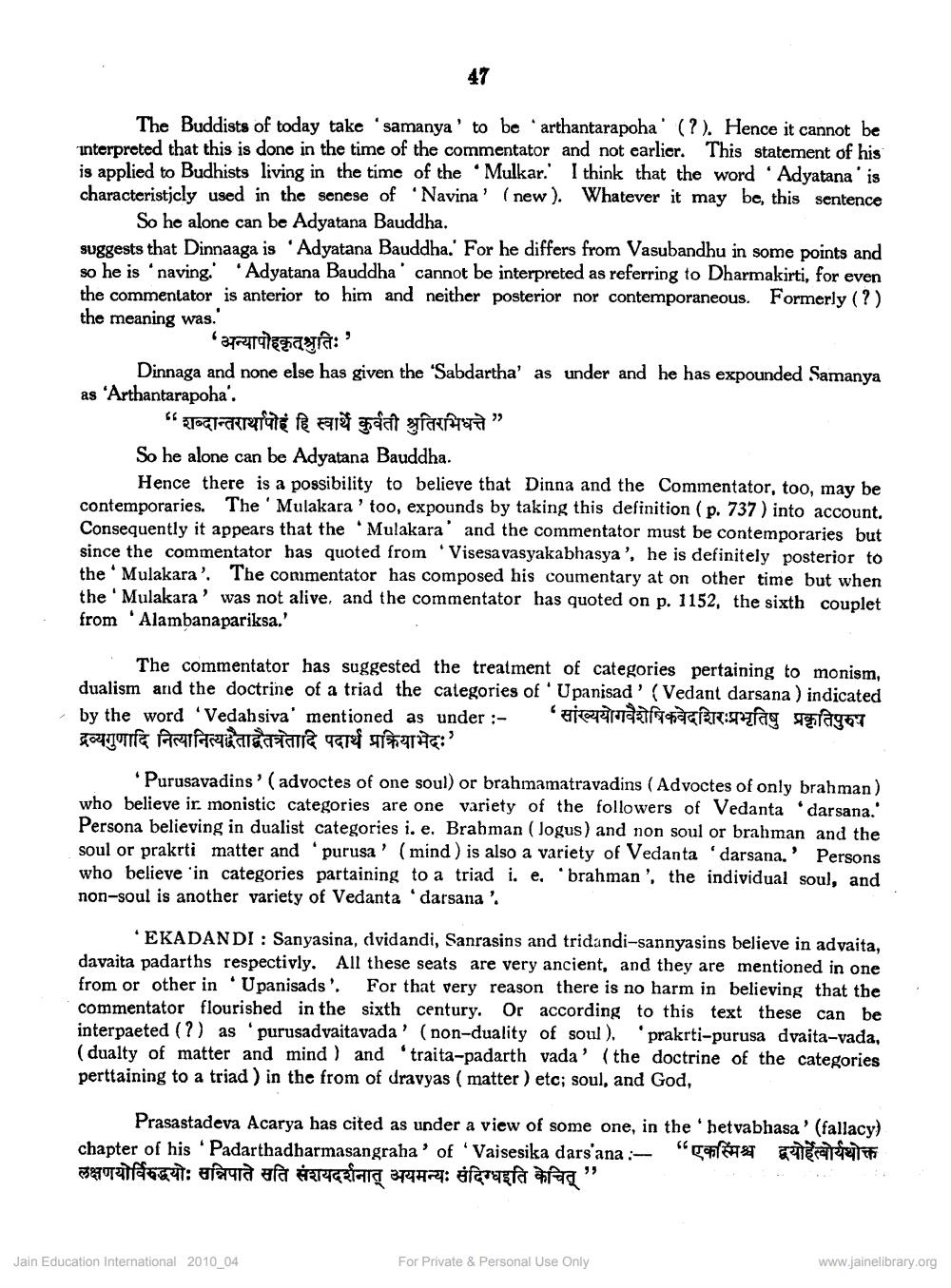________________
So he alone can be Adyarana Reddha. For he differs from Vasubana parmakirti, for even
The Buddists of today take 'samanya' to be 'arthantarapoha' (?). Hence it cannot be interpreted that this is done in the time of the commentator and not earlier. This statement of his is applied to Budhists living in the time of the Mulkar. I think that the word ' Adyatana' is characteristicly used in the senese of 'Navina' (new). Whatever it may be, this sentence
So he alone can be Adyatana Bauddha. suggests that Dinnaaga is 'Adyatana Bauddha. For he differs from Vasubandhu in some points and so he is 'naving 'Adyatana Bauddha' cannot be interpreted as referring to Dharmakirti, for even the commentator is anterior to him and neither posterior nor contemporaneous. Formerly (?) the meaning was.'
Bruegaya: Dinnaga and none else has given the 'Sabdartha' as under and he has expounded Samanya as 'Arthantarapoha.
"TOCIRRATGE RF adat fer ". So he alone can be Adyatana Bauddha.
Hence there is a possibility to believe that Dinna and the Commentator, too, may be contemporaries. The 'Mulakara'too, expounds by taking this definition (p. 737) into account. Consequently it appears that the 'Mulakaraand the commentator must be contemporaries but since the commentator has quoted from Visesa vasyakabhasya', he is definitely posterior to the 'Mulakara'. The commentator has composed his coumentary at on other time but when the 'Mulakara' was not alive, and the commentator has quoted on p. 1152, the sixth couplet from 'Alambanapariksa.'
The commentator has suggested the treatment of categories pertaining to monism, dualism and the doctrine of a triad the categories of 'Upanisad' (Vedant darsana ) indicated by the word 'Vedahsiva' mentioned as under :- 'acere :trag Telage द्रव्यगुणादि नित्यानित्यद्वैताद्वैतत्रतादि पदार्थ प्रक्रियाभेदः'
"Purusavadins' (advoctes of one soul) or brahmamatravadins ( Advoctes of only brahman) who believe ir monistic categories are one variety of the followers of Vedanta 'darsana.' Persona believing in dualist categories i. e. Brahman (Jogus) and non soul or brahman and the soul or prakrti matter and 'purusa' (mind) is also a variety of Vedanta 'darsana.' Persons who believe 'in categories partaining to a triad i. e, 'brahman', the individual soul, and non-soul is another variety of Vedanta 'darsana'.
EKADANDI : Sanyasina, dvidandi, Sanrasins and tridandi-sannyasins believe in advaita, davaita padarths respectivly. All these seats are very ancient, and they are mentioned in one from or other in 'Upanisads'. For that very reason there is no harm in believing that the commentator flourished in the sixth century. Or according to this text these can be interpaeted (?) as purusadvaitavada' (non-duality of soul). 'prakrti-purusa dvaita-vada, (dualty of matter and mind) and "traita-padarth vada' (the doctrine of the categories perttaining to a triad ) in the from of dravyas ( matter ) etc; soul, and God,
Prasastadeva Acarya has cited as under a view of some one, in the 'het vabhasa' (fallacy) chapter of his 'Padarthadharmasangraha' of 'Vaisesika dars'ana - "Pa 160911 लक्षणयोर्विरुद्धयोः सन्निपाते सति संशयदर्शनात अयमन्यः संदिग्धइति केचित्"
Jain Education International 2010_04
For Private & Personal Use Only
www.jainelibrary.org




